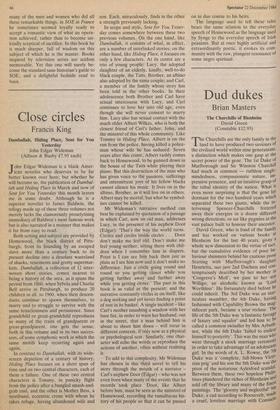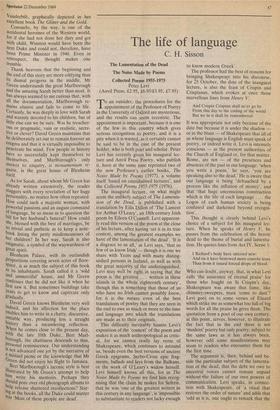Dud dukes
Brian Masters
The Churchills of Blenheim David Green (Constable £12.95)
The Churchills are the only family in the land to have produced two saviours of the civilised world within nine generations, a distinction which makes one gasp at the secret power of the gene. The 1st Duke of Marlborough and Sir Winston Churchill had much in common — ruthless single- mindedness, compassionate nature, im- pressive presence, and an intuitive grasp of the tribal identity of the nation. What Is even more surprising is that the gene lay dormant for the two hundred years which separated these two giants, while the in- tervening Spencer-Churchills frittered away their energies in a dozen different wrong directions, or sat like pygmies in the vast palace built to honour their ancestor. David Green, who is fond of the family and has worked on various books at Blenheim for the last 40 years, gives a whole new dimension to the virtue of tact, but the cumulative evidence of poor be' haviour shimmers behind his cautious prose Starting with Marlborough's daughter Henrietta, suo jure 2nd Duchess and con- temptuously described by her mother as 'Congreve's Moll', we pass to her son Willigo, an alcoholic known as 'Lord Worthless'. He fortunately died before he could inherit. The 3rd Duke was an Mg' ticulate mumbler, the 4th Duke, having fashioned with Capability Brown the mg' nificent park, became a sour recluse. The life of the 5th Duke was 'a fantastic farrago of luxury and squalor' and led him to be called a common swindler by Mrs Arbuth- not, while the 6th Duke 'failed to endear himself to posterity'. This was the man who went through a mock marriage ceremony in order to take advantage of an adolescent girl. In the words of A. L. Rowse, the 7th Duke was a 'complete, full-blown Victo- rian prig' and his son the 8th Duke was the pivot of the notorious Aylesford scandal. Between them, these two hopeless Phil's; tines plundered the riches of Blenheim and sold off the library and many of the finest paintings. The 'gloomy and neglectful' 9t" Duke, a cad according to Roosevelt, made a cruel, loveless marriage with Consuel° Vanderbilt, graphically depicted in her excellent book The Glitter and the Gold.
Consuelo, by the way, is one of the accidental heroines of the Western world, for if she had not done her duty and got With child, Winston would have been the next Duke and could not, therefore, have been Prime Minister in 1940. Even in retrospect, the thought makes one tremble.
Thank heavens that the beginning and the end of this story are more edifying than its dismal progress in the middle. Mr Green understands the great Marlborough and the amazing Sarah better than most. It has always seemed to me curious that, with all the documentation, Marlborough re- mains elusive and fails to come to life. Certainly, he was deeply in love with Sarah and warmly devoted to his children, but of little else can we be sure. Was he treacher- ous or pragmatic, vain or realistic, secre- tive or clever? David Green maintains that he deliberately set out to remain forever an enigma and that it is virtually impossible to Penetrate his mind. Few people in history have so successfully kept themselves to themselves, and Marlborough's only answer to enquiry, si monumentum re- quiris, is the great house. of Blenheim itself.
As for Sarah, about whom Mr Green has already written extensively, the reader staggers with every revelation of her huge Personality, no matter how often repeated. How could such a majestic woman, with Powerful passions and an august command of language, be so mean as to question the bill for her husband's funeral? How could she, blessed with the best of marriages, be so trivial and pathetic as to keep a note- book listing the petty misdemeanours of her children? In her way, Sarah is also enigmatic, a symbol of the waywardness of great spirit.
' Blenheim Palace, with its outlandish Proportions covering seven acres of floor- space, is as much the subject of this book as its inhabitants. Sarah called it a 'wild and unmerciful' house, and Mr Green confesses that he did not like it when he first saw it. But sometimes buildings take Years to get to know and captivate only gradually. David Green knows Blenheim very well indeed, and his affection for the place enables him to write in a chatty, discursive, amiable way, producing less a straight history than a meandering reflection. When he comes close to the present day, with the late 10th Duke, Bert Marl- borough, the chattiness descends to thin, personal reminiscence. Our understanding Is not advanced one jot by the narrative of a‘ mislaid picnic or the kriowledge that Mr Green did not enjoy his flight to Jamaica. Bert Marlborough's laconic style is best illustrated by Mr Green's attempt to help him write his memoirs. Perhaps they should pore over old photograph albums to help release shuttered recollections? Star- ing at the books, all the Duke could mutter Was 'Most of these people are dead'.







































































 Previous page
Previous page